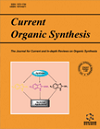-
oa Editorial [Hot Topic: C-C and C-X Couplings in Organic Synthesis Part 1. C-C Couplings (Guest Editor : Rafael Luque)
- Source: Current Organic Synthesis, Volume 7, Issue 6, Dec 2010, p. 532 - 532
-
- 01 Dec 2010
Abstract
C-C bond forming reactions are currently present in many organic synthetic protocols for the preparation of a plethora of chemical products and intermediates with a wide range of applications in different areas including fragrances, pharmaceuticals, agrochemicals and dyes. The fascinating journey from serendipity to discovery of C-C coupling reactions started in the early 1970s with the first reports of the Suzuki, Heck, Sonogashira and Kumada reactions that were subsequently followed by a series of reports of related processes such as the Stille coupling. Ever since, we have witnessed a continuous and amazing development in importance of such processes in Organic Synthesis. Several protocols, reactions conditions and methodologies have progressed this engaging area of knowledge to limits that scientists would have never dreamt of last century. Heterogeneous catalysts that allow full separation and recycling upon reaction completion, the use of microwave irradiation with short times of reaction (typically minutes), aqueous protocols, efficient and atom-economic reactions that avoid the use of stoichiometric reagents as well as tandem/one-step processes and domino reactions, among others, can be considered as some significant achievements of greener synthetic coupling methodologies reported to date. This special issue, divided in two parts, is dedicated to the latest developments in the areas of C-C and C-Heteroatom couplings in Organic Synthesis. The first part has been devoted to C-C couplings, from the simplest molecules and couplings including model Suzuki, Heck and Sonogashira reactions, to the synthesis of natural products and pharmaceuticals as well as industrial C-C coupling processes. These will include a range of C-C couplings in Organic Synthesis, industrial applications of C-C couplings, active species in the Heck reaction and C-C oxidative couplings. The quality and distribution of the contributions was taken into consideration when inviting worlwide respected and well-known leaders in the field including Profs. Clark (UK), Karimi (Iran) and Lin (Singapur) as well as emerging young researchers such as Drs. Colmenares (Poland) and Iliopoulou (Greece). The editor was delighted to assemble such an outstanding list of contributors for the special issue and would like to thank deeply the authors and the journal for their cooperation and assistance during the past months. There is only one but most important thing left, the readers! The editor sincerely hopes both parts of this special issue will be able to attract the attention of many readers in the field as well as introduce many others in the fascinating world of coupling chemistry and look forward to contemplating further improvements in this area inspired (why not) by some of the contributions included in this issue. With very best wishes for the success of the special issue.


